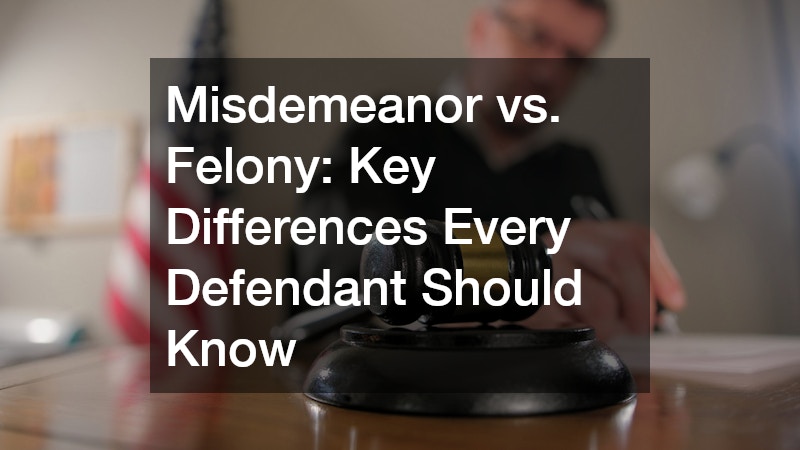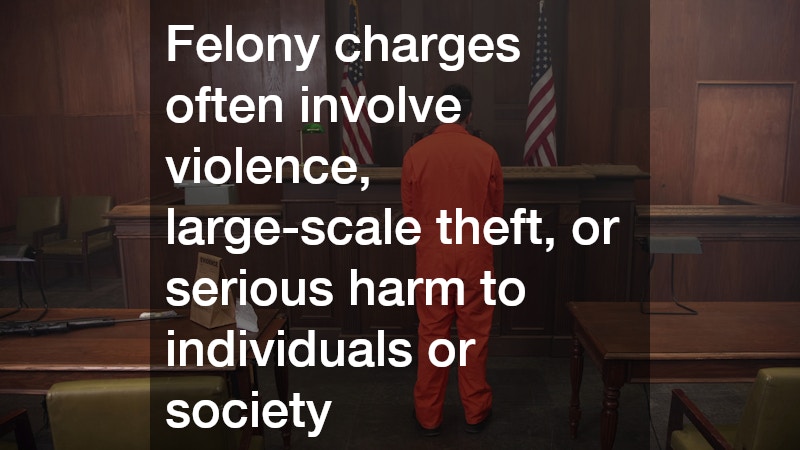
Highlights:
-
Misdemeanors carry lighter penalties (usually under one year in jail) but still create lasting consequences.
-
Felonies are the most serious charges, often leading to prison, large fines, and loss of civil rights.
-
Both misdemeanors and felonies appear on background checks, affecting jobs, housing, and opportunities.
-
Some crimes are “wobblers,” which means they can be charged as either misdemeanors or felonies.
-
A criminal defense attorney who handles misdemeanors and felonies is critical for protecting rights and minimizing penalties.
-
Legal representation can often reduce charges, negotiate plea deals, or secure alternatives to jail.
Being charged with a crime can be overwhelming, especially if you are unfamiliar with the legal system. Whether the charge is a misdemeanor or a felony, your future, freedom, and reputation are on the line. The distinction between these two categories of criminal charges is more than just terminology—it determines the severity of potential penalties, the complexity of your case, and how a criminal defense attorney who handles misdemeanors and felonies can protect your rights.
This article breaks down the essential differences between misdemeanors and felonies, explores the legal consequences of each, and explains why skilled representation is critical no matter the charge.
What Is a Misdemeanor?
A misdemeanor is generally considered a lower-level criminal offense, but it should not be taken lightly. Convictions can still lead to jail time, financial penalties, and lasting consequences on employment and housing opportunities.
Common Characteristics of Misdemeanors:
-
Less severe penalties compared to felonies
-
Maximum jail sentence typically up to one year in a local or county jail (not state prison)
-
Fines ranging from a few hundred dollars to several thousand dollars
-
Probation or community service as alternatives or supplements to jail time
-
Criminal record impact, which may still show up on background checks
Examples of Misdemeanor Offenses:
-
Petty theft or shoplifting
-
Simple assault or battery without serious injury
-
First-time DUI (without injury or death)
-
Trespassing or vandalism
-
Disorderly conduct
-
Possession of small amounts of controlled substances (in some states)
Even though misdemeanors are less serious than felonies, a conviction can disrupt your life in significant ways. Employers, landlords, and even schools may consider misdemeanor records during background checks. That is why consulting a criminal defense attorney who handles misdemeanors and felonies is still crucial.
What Is a Felony?
A felony is the most serious category of crime, carrying harsher punishments and long-term consequences. Felony charges often involve violence, large-scale theft, or serious harm to individuals or society.
Common Characteristics of Felonies:
-
Sentences longer than one year, typically served in state or federal prison
-
High fines, sometimes reaching tens of thousands of dollars
-
Loss of civil rights, such as the right to vote, hold public office, or own firearms (in many states)
-
Parole and probation, often lasting several years after release
-
Permanent criminal record that can be difficult, if not impossible, to expunge
Examples of Felony Offenses:
-
Murder, manslaughter, or attempted homicide
-
Armed robbery or burglary
-
Aggravated assault with a deadly weapon
-
Drug trafficking or distribution
-
Kidnapping
-
White-collar crimes like fraud or embezzlement
-
Sex crimes, including rape and exploitation
Felony charges can change the trajectory of your life forever. Hiring an experienced criminal defense attorney who handles misdemeanors and felonies is not just recommended—it is essential to protect your freedom.
Misdemeanor vs. Felony: The Core Differences
At the most basic level, misdemeanors and felonies differ in severity of punishment, impact on rights, and long-term consequences. Below is a comparison that highlights the key distinctions:
Legal Penalties
-
Misdemeanor: Up to one year in county jail; fines generally lower.
-
Felony: More than one year in state prison; fines significantly higher.
Criminal Record Impact
-
Misdemeanor: May appear on background checks but can sometimes be expunged.
-
Felony: Permanent record with long-lasting stigma; more difficult to seal or expunge.
Civil Rights
-
Misdemeanor: Usually does not impact voting or firearm rights.
-
Felony: Can strip rights to vote, bear arms, or serve on a jury.
Social and Employment Consequences
-
Misdemeanor: Employers may hesitate to hire but impact is less severe than felonies.
-
Felony: Severe barriers to employment, housing, and professional licensing.
Court Process
-
Misdemeanor: Often resolved faster, sometimes without a jury trial.
-
Felony: Involves lengthy court proceedings, including preliminary hearings and potential jury trials.
Understanding these differences helps defendants make informed decisions. However, navigating the criminal justice system requires guidance from a criminal defense attorney who handles misdemeanors and felonies, who can explain options such as plea bargains, diversion programs, or trial strategies.
The Role of a Criminal Defense Attorney in Misdemeanor Cases
Some people mistakenly believe they can handle a misdemeanor without legal counsel. This can be a costly mistake. Even minor charges can lead to lasting records that harm your future.
How Attorneys Help in Misdemeanor Cases:
-
Negotiating plea deals to reduce charges or penalties
-
Exploring alternatives to jail, such as diversion programs or community service
-
Challenging unlawful arrests or improper police conduct
-
Helping clients pursue expungement after completing their sentence
An experienced criminal defense attorney who handles misdemeanors and felonies understands the importance of minimizing the impact of a misdemeanor conviction on your future.
The Role of a Criminal Defense Attorney in Felony Cases
Felony charges can have life-altering consequences. The legal strategy in these cases must be aggressive, thorough, and carefully planned.
How Attorneys Help in Felony Cases:
-
Conducting independent investigations to gather evidence
-
Challenging witness testimony and forensic evidence
-
Filing motions to suppress illegally obtained evidence
-
Negotiating plea bargains to reduce a felony to a misdemeanor
-
Preparing strong defense strategies for trial
A skilled criminal defense attorney who handles misdemeanors and felonies provides not only legal knowledge but also courtroom experience, which is critical in high-stakes felony cases.
Long-Term Consequences of Convictions
The penalties of criminal charges go beyond jail time and fines. Both misdemeanors and felonies can shape your personal and professional future.
Consequences of a Misdemeanor Conviction:
-
Employment challenges (though often less severe than felonies)
-
Denial of rental housing applications
-
Possible immigration consequences for non-citizens
-
Restricted opportunities in fields like education, healthcare, or government work
Consequences of a Felony Conviction:
-
Permanent loss of certain civil rights
-
Ineligibility for professional licenses in many industries
-
Difficulty securing housing or loans
-
Social stigma and loss of reputation
-
Restrictions on international travel
This is why individuals charged with either type of offense should consult a criminal defense attorney who handles misdemeanors and felonies as early as possible.
Frequently Asked Questions
Can a misdemeanor be upgraded to a felony?
Yes. Some crimes, known as “wobblers,” can be charged as either misdemeanors or felonies depending on the circumstances. A criminal defense attorney who handles misdemeanors and felonies can often argue to reduce the charge.
Are misdemeanors eligible for expungement?
In many states, yes. Misdemeanors are often easier to expunge than felonies, though the eligibility requirements vary.
Can felony charges ever be reduced to misdemeanors?
Yes. With strong legal advocacy, certain felony charges may be reduced through plea bargaining or by convincing the court to reclassify the offense.
Do I need a lawyer for a misdemeanor?
While not legally required, it is highly recommended. Even misdemeanors can result in criminal records, fines, and jail time. A lawyer increases your chances of a favorable outcome.
Why Legal Representation Matters
Whether you are facing a misdemeanor shoplifting charge or a felony assault accusation, your choice of legal counsel can shape your future. A criminal defense attorney who handles misdemeanors and felonies understands the nuances of both categories and can tailor strategies to your unique circumstances. Without skilled representation, you risk harsher penalties, a permanent criminal record, and life-changing consequences.
The Bottom Line
The distinction between misdemeanors and felonies is critical for anyone accused of a crime. Misdemeanors may involve lighter penalties but can still impact your life in significant ways. Felonies, on the other hand, carry severe punishments that can permanently alter your rights and opportunities.
No matter the charge, navigating the criminal justice system is complex. The best step you can take is to work with a criminal defense attorney who handles misdemeanors and felonies, someone who can safeguard your rights, fight for reduced penalties, and help you protect your future.
Understanding the differences is the first step—taking action with the right legal representation is the next.

